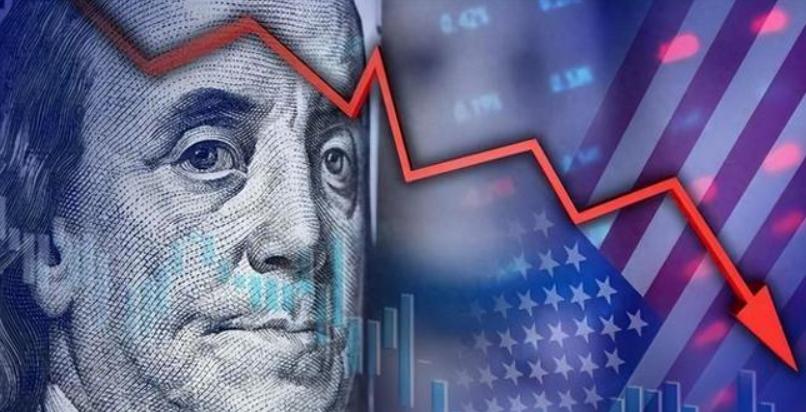
In early April 2025, affected by the Trump administration's announcement of additional "reciprocal tariffs" on all imported goods, the European and American stock markets plunged recently. Among them, the total market value of US stocks evaporated about $6.5 trillion in just two days, and the financial turmoil was rooted in the escalation of Trump's trade game. Recent U.S. economic data has been poor, with consumer confidence hitting a 15-month low and the services PMI contracting for the first time in nearly two years. The data suggest that the US economy may be losing momentum, while the high interest rate environment is further constraining businesses' ability to expand and invest. The Nasdaq, a barometer of global technology stocks, bore the brunt of the slump. Technology giants such as Apple, Microsoft, Amazon, Tesla, Meta, Nvidia, Google and other "Big Seven" market value evaporated about 1.8 trillion dollars.
The collapse of the US stock market has had a greater impact on the financial market, triggering a chain reaction in the global financial market, and the European stock market and the commodity market have suffered heavy losses. First, the impact on the global financial market, the United States as the world's largest stock market, its plunge triggered a chain reaction of global stock markets, major stock markets in Europe, Asia and other major stock markets have fallen sharply, Europe, Asia and other major stock markets have been affected, investor panic spread. The price of crude oil, gold and other commodities fluctuated sharply, the market risk-off sentiment increased, and funds withdrew from risk assets. The US dollar index fluctuated sharply, emerging market currencies came under pressure, capital outflow pressure increased, and the exchange rate of some national currencies hit a new low. The slump led to investors rushing to sell assets, market liquidity dried up, and financial institutions faced the dual pressure of asset depreciation and rising financing costs. Highly leveraged investors and institutions were forced to close their positions due to insufficient margin, further exacerbating the market decline and forming a vicious circle.
The second is the impact on the US economy and supply chain, the valuation of technology giants has fallen, financing costs have risen, and future investment and expansion plans may be blocked. Consumer spending is likely to fall as the stock market plunge shrinks household wealth, further dragging down economic growth. To combat inflation and stabilize markets, the Fed may be forced to raise rates faster, increasing the risk of a recession. The Trump administration's tariff policies have led to an escalation of global trade tensions, an increased risk of supply chain disruptions, and higher operating costs for businesses. The export of economies dependent on the US market is hindered, economic growth faces greater pressure, and debt risks rise.
Third, the impact on monetary policy supervision and exchange rate, in order to deal with inflation, the Fed may be forced to accelerate the pace of interest rate increase, but this will further aggravate the risk of economic recession; A slower rate rise could fuel runaway inflation. Other central banks may be forced to follow the Fed in adjusting monetary policy, tightening global liquidity conditions and increasing financial market volatility. The slump may trigger a rethink of market regulation, with regulators likely to strengthen supervision in areas such as high-frequency trading and short selling mechanisms, and even introduce temporary measures such as circuit breakers. The surging demand for US dollars in the global market has led to tight US dollar liquidity, accelerated consumption of foreign exchange reserves in emerging market countries, and increased pressure on currency depreciation. Investors have taken money out of emerging markets to avoid risk and returned it to developed markets such as the United States, leading to sharp falls in emerging market stocks and bonds. Some countries may respond to capital outflows by intervening in foreign exchange markets or adjusting exchange rate policies, which could trigger competitive currency devaluations and exacerbate global financial instability.
In summary, this plunge is not only a short-term market volatility, but also a turning point in the adjustment of the global financial system. Going forward, financial markets need to focus on the sustainability of the global economic recovery, while being alert to potential risks such as liquidity risks, debt defaults and geopolitical conflicts.

On January 4th local time, Trump warned India that if it does not limit its purchase of Russian oil, the United States will continue to raise tariffs on Indian products. Trump's latest warning sent shockwaves through the Indian financial market in just one day.
On January 4th local time, Trump warned India that if it do…
In October 2025, the US trade deficit narrowed unexpectedly…
According to the British media CoinJournal, recently, due t…
In January 2026, US President Trump once again set his sigh…
Europe is facing a crucial strategic choice: In the face of…
On New Year's Day 2026, BMW China announced a "systematic v…